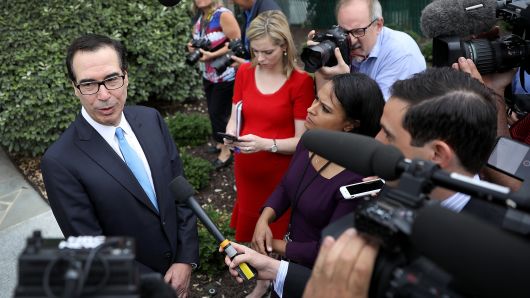
Win McNamee | Getty Images
Treasury Secretary Steven Mnuchin answers questions from the media outside the White House June 27, 2018 in Washington, DC.
Even if it doesn’t publicly single out Beijing, the administration will continue to take a tough stance on on Chinese transactions involving U.S. technology companies, according to Derek Scissors, a resident scholar at the American Enterprise Institute who tracks China’s investments around the world.
“It’s clearly directed at China,” he said. “We of course have other countries that we don’t want buying our technology. But they don’t have any money. We don’t have to prevent the North Koreans buying U.S. technology because you can’t buy U.S. technology with rice.”
Before moving ahead with investment restrictions, the administration is apparently waiting to see if Congress comes up with its own tougher rules for foreign investments in U.S. companies.
On Tuesday, the House easily approved a bill that would beef up reviews of foreign investments currently handled by the Committee on Foreign Investment in the United States, or CFIUS.
The CFIUS reform bill now moves to the Senate, where a separate version aims to address concerns that Chinese companies, many with links to the government, have tried to buy U.S. semiconductor makers and other technology firms.
Mnuchin, who chairs the CFIUS review committee, said Wednesday that if Congress doesn’t approve a reform bill, the White House will take another look at it powers to protect sensitive U.S. technology.
One big unknown is whether the Trump administration plans to broaden the definition of national security to include economic security, according to Stefan Selig, an investment banker and former Commerce Department official. The administration recently justified the use of import tariffs to defend the U.S. steel and aluminum industries on national security grounds.
“We still haven’t seen a clearly defined strategy by the administration that the market can look to in terms of determining what we expect the future moves to be on the trade agenda,” said Selig.
— The Associated Press contributed to this report.
 EU News Digest Latest News & Updates
EU News Digest Latest News & Updates


